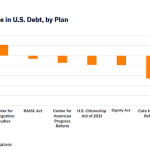
Britain is on track to experience the largest exodus of millionaires globally as wealthy individuals flee the country ahead of the Government’s planned crackdown on non-domiciled tax (non-dom) rules.
According to analysis by the Adam Smith Institute, the share of the UK population classed as millionaires is expected to drop by 20% over the next five years, falling from 4.55% to 3.62%. In contrast, other European countries such as Germany, France, and Italy are predicted to grow their millionaire populations during the same period.
The exodus is being driven by high taxes, impending changes to the non-dom regime, and what the think tank described as “a hostile culture for wealth creators.” Labour’s pledge to close what it views as loopholes in the non-dom system is a central factor in the departure of the ultra-wealthy. However, Chancellor Rachel Reeves is reportedly reconsidering the policy amid concerns that it could cost the UK vital tax revenues if wealthy individuals leave en masse.
Nadhim Zahawi, a former chancellor, has called on Reeves to abandon the anti-non-dom stance and ease wealth taxes in the upcoming Budget. “The rate at which millionaires are leaving the UK is a vote of no confidence in both our current tax and regulatory regime,” Zahawi said, warning that the departure of these individuals could reduce funds for public services and hinder investment in the economy.
According to the Adam Smith Institute, the richest 1% of earners already pay 29% of the country’s income tax, making their exit a significant blow to the Treasury. An HM Treasury spokesperson defended the Government’s tax policy, stating, “We are addressing unfairness in the tax system so we can raise the revenue to rebuild our public services.”
In addition to non-dom reforms, the Government may also be considering relaxing inheritance tax rules, following warnings from various economists and business leaders.
A separate report from the Centre for the Analysis of Taxation has urged the Chancellor to consider imposing an “exit tax” on entrepreneurs and business owners leaving the country. This tax would apply to individuals with significant shareholdings who relocate abroad, ensuring they pay taxes on unrealised capital gains before their departure.
Andy Summers, director of the Centre, pointed out that countries such as Australia and Canada already implement this kind of exit tax, and there is no reason why the UK couldn’t follow suit. “Charging CGT on people who leave the UK is not about punishing them for leaving. It’s simply saying: ‘you need to pay your bill on the way out,’” Summers explained.
With growing concerns about tax policy driving the wealthy away from Britain, the outcome of the upcoming Budget will be crucial in determining whether the UK can retain its status as a leading destination for wealth creators and entrepreneurs.
Read more:
Britain faces largest exodus of millionaires globally amid tax crackdown






